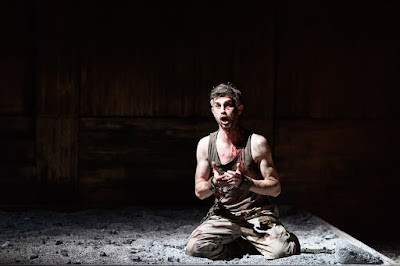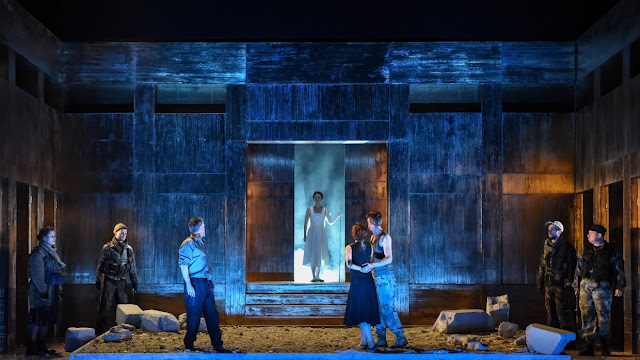 |
| ETO - Dardanus - Edward Jowle, Alessandro Fisher, Timothy Nelson, Katy Thomson, Grant Doyle, Mikel Uskola (Photo Jane Hobson) |
Reviewed by Robert Hugill on Oct 6 2017 Star rating:
A rare outing for Rameau's opera gives much to celebrate, with intense performances from the principals
 |
| Galina Averina (Photo Jane Hobson) |
Theatre director Douglas Rintoul's new production of Rameau's Dardanus debuted at the Hackney Empire on 6 October 2017 in tandem with ETO's production of Handel's Giulio Cesare (see my review). Galina Averina sang Iphise with Anthony Gregory as Dardanus, plus Grant Doyle as Teucer, Timothy Nelson as Antenor, Alessandro Fisher as Arcas, and Frederick Long as Ismenor. Jonathan Williams conducted the Old Street Band.
Like many Rameau operas, Dardanus has a complex textual history. The legendary Dardanus, son Jupiter, is credited with the founding of Troy with the aid of Teucer, King of the Phyrgians. Rameau and his librettist Charles-Antoine Leclerc de La Bruere concocted a back story with Dardanus and Teucer at war and Dardanus and Teucer's daughter Iphise in love with each other. The first version, premiered in 1739 had lots of extraneous spectacle including a sea monster which gave weakness to the plot. Revisions in 1744 and 1760 removed most of these and Rameau seemed to be pushing the piece into the direction of Gluck's concentrated French operas. ETO performed the work in a new edition (based on the 1744 and 1760 revision) by Gilles Rico, and this was the first UK staging of the 1744 version.
 |
| Anthony Gregory (Photo Jane Hobson) |
Perhaps the problem was the setting. Whilst Cordelia Chisholm's set is common to both the Rameau and Handel productions, here the setting was a modern conflict, with a large gravel pit at its centre making stage action tricky. Now Rameau's operas were written at a time when war did not preclude dance and entertainment, when the French royal court could go on progress to see the war effort. The opera is not about war, the conflict is more a device to keep Dardanus and Iphise apart for nearly five acts. But Rintoul set the piece in the context of a modern conflict, total war, everyone wore fatigues so the presence of dance here would be jejeune.
Thankfully we had performances from the principals full of concentrated intensity and passion.
 |
| ETO - Dardanus - Timothy Nelson (Photo Jane Hobson) |
That Anthony Gregory sang the high lying line of Dardanus' haut-contre part and survived is something in itself. But he did so whilst singing with concentrated intensity and giving Dardanus the necessary heroic ping (he is after all an action character, not a drip). He made us care for the character, and given the trials and travails he was going through, a little roughness of tone was acceptable. I certainly hope we get to hear him in an haut-contre role again. Between them Gregory and Averina carried the bulk of the drama, and made us really believe in these ridiculously moral and scrupulous people, bringing a very human quality to their suffering. Passages from their Act Four prison scene are astonishing, and really made you understand why ETO chose to present the piece for all the opera's faults.
The piece is essentially a love triangle, Timothy Nelson's Antenor is betrothed to Iphise and connives at Dardanus's death to free Iphise from her attraction. Nelson took some time to settle down and accustom himself to Antenor's high baritone line. His opening scenes had an unfortunate tendency to wander in tuning, but by his crucial final death scene, Nelson sang with moving commitment and showed he will settle into the role well.
 |
| Anthony Gregory, Frederick Long (Photo Jane Hobson) |
The magical element was not entirely removed from the opera in Rameau's revisions, but unfortunately the role of the prophet Isemnor is rather unclear and his interventions seemed to almost make matters worse. Frederick Long as Ismenor, however, was suitably vivid and almost convinced us.
The hard working members of the chorus (Eleanor Penfold, Katy Thomson, Edward Jowle, Mikel Uskola Cobos) invested their role with considerable energy, and Eleanor Penfold made a lovely Venus at the end, her simple brilliant white dress forming a fine contrast to the drabness of the other costumes.
There were other aspects to the production which did not seem quite settled. Jonathan Williams' conducting seemed a trifle too hectic and there were ensemble problems between stage and pit which no doubt will settle down during the run. The orchestral playing sounded too busily hectic, and though there were some individual instrumental delights, overall it seemed as if the band had not yet got Rameau in its bones the way it had with the previous nights' Handel.
 |
| English Touring Opera - Dardanus (Photo Jane Hobson) |
Recordings: With two such vastly differing versions of the opera (1739 and 1744) a listener has to choose (or buy both!).
- 1739: Mark Minkowski on Archiv opts for the 1739 version, full of lovely music and perhaps best heard on CD rather than worrying about dramatic inconsistencies on stage (available from Amazon).
- 1744: Raphael Pichon on Alpha opts for 1744 (complete with the allegorical prologue omitted by ETO), also available on Amazon.
- 1739+1744: Alternatively you might consider an older generation of recording, Raymond Leppard, with Frederica von Stade and Christane Eda-Pierre, opts for a conflation of 1739 and 1744 (available from Amazon).
Elsewhere on this blog:
- 30 years on and the charm holds: Jonathan Miller's production of Rossini's The Barber of Seville at ENO - Opera review
- Inspirations and loop pedals: Composer Tom Green on his new opera - interview
- Magnificently uncut: Handel's Giulio Cesare from English Touring Opera - Opera review
- Daring and original: Radical re-working of Purcell's King Arthur from Daisy Evans and the Academy of Ancient Music - opera review
- Middle of the road but far from boring: Mozart's Requiem from Winchester Collge - CD review
- Terrific performance: Damian Thantrey in Thomas Hyde's That Man Stephen Ward - CD review
- Double helping: chamber music by Michael Haydn, RVW, Alec Roth, Haydn, Thomas Ades, and Schubert in a pair of concerts from the Hatfield House Chamber Music Festival - concert review
- We all say yé-yé: The Chanteuse talks about recreating the songs of Nobel Prize-winning author Patrick Modiano - interview
- Strong singing & stage spectacle: Verdi's Aida at English National Opera - Opera review
- Britten & Silvestrov: Jan Vogler, London Philharmonic & Vladimir Jurowski - concert review
- Architecture into music: Tamsin Waley-Cohen in Freya Waley-Cohen's Permutations - CD review
- Daring: Fieri Consort in Monteverdi and Ben Rowarth - CD review
- Home

.jpg)









No comments:
Post a Comment